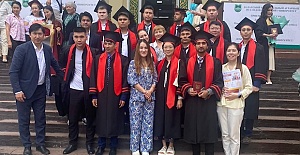Enfield Town Schools’ Partnership (ETSP), an exciting alliance of twenty richly-diverse schools in Enfield, North London,is celebrating after receiving a grant worth over £6,500 from the Institution of Engineering and Technology (IET) and the Institution of Mechanical Engineers (IMechE).
With the aim of inspiring children to become the engineers of the future, ETSP has embarked on a term-long STEM project called ‘The Art of Engineering’. Children are already hard at work learning about structures and the work of engineers and the project will culminate in a science fair day and exhibition. Year 5 pupils at the ETSP’s Primary schools will undertake an engineering project and Year 9 pupils at Chace Community School will engage in, and support, the science fair. The project combines science and creative thinking to address the needs and capabilities of the pupils at Waverley School or others within the local school community.
The Engineering Education Grant Scheme (EEGS), which is run by the Institution of Engineering and Technology and the Institution of Mechanical Engineers, aims to engage young people aged 5-19 in learning about engineering and to develop the professional skills of those involved in supporting Science Technology Engineering and Mathematics (STEM) learning and careers awareness. The EEGS also supports projects that improve wider engineering literacy.
Emma Kolaru, ETSP Partnership Coordinator, said: “We are absolutely thrilled to have received this grant! This will allow us to deliver an exciting project that will develop and nurture a passion for science and engineering. We want to inspire our children and help turn dreams into reality.”
Peter Finegold, Head of Education and Skills at the Institution of Mechanical Engineers, said: “The Art of Engineering project is a fantastic example of the kind of projects the EEGS scheme aims to promote. The UK is facing a critical engineering skills shortage and showing young people how creative and exciting engineering can be is a key way of inspiring the engineers of tomorrow.”
David Lakin, Head of Education at the Institution of Engineering and Technology, said: “In order to tackle the engineering skills gap we need more graduates and apprentices to enter the profession, and this can only happen if more school-age children – girls as well as boys – are attracted to, and choose to study Science, Technology, Engineering and Maths subjects. The IET is investing considerable resource in EEGS to support vital projects like The Art of Engineering, which highlight the exciting, creative and rewarding world of engineering careers to young people.”
Organisations capable of developing and delivering UK-based educational activities are eligible to apply to the EEGS scheme.
There are two levels of funding available. Awards of up to £5000 are available for standard applications to the fund, and up-to-four awards of £15,000 are available each year.



 Advice for Enfield residents ahead of the General Election
Advice for Enfield residents ahead of the General Election Sunak promises tax cuts, economic stability, Conservative Party election manifesto
Sunak promises tax cuts, economic stability, Conservative Party election manifesto Ertan Karpazli, an independent MP candidate for the Enfield North constituency
Ertan Karpazli, an independent MP candidate for the Enfield North constituency Rishi Sunak announces a general election in a statement outside Downing Street
Rishi Sunak announces a general election in a statement outside Downing Street Residents of Spanish island of Mallorca launch initiative to thank tourists amid protests over mass tourism
Residents of Spanish island of Mallorca launch initiative to thank tourists amid protests over mass tourism Srebrenica Remembered, Lessons for Justice and Peace! YEE London held a reflective event
Srebrenica Remembered, Lessons for Justice and Peace! YEE London held a reflective event British Premier Keir Starmer to reset UK-EU relations with high-profile meetings
British Premier Keir Starmer to reset UK-EU relations with high-profile meetings Voters head to polls for UK general election
Voters head to polls for UK general election The Swiss official will take charge of the match between Real Madrid and Atalanta in Warsaw
The Swiss official will take charge of the match between Real Madrid and Atalanta in Warsaw Applications are now open for Walking and Cycling Grants London until 9 September 2024
Applications are now open for Walking and Cycling Grants London until 9 September 2024  Two Circles also appointed as exclusive media sales agency for UEFA Women’s Champions League
Two Circles also appointed as exclusive media sales agency for UEFA Women’s Champions League  England manager Gareth Southgate has resigned two days after defeat by Spain
England manager Gareth Southgate has resigned two days after defeat by Spain Joyce and Snell's planning application gets stamp of approval
Joyce and Snell's planning application gets stamp of approval The amount of bounce back loans fully repaid is just %13
The amount of bounce back loans fully repaid is just %13 Petrol prices higher than they should be, says RAC
Petrol prices higher than they should be, says RAC UEFA and Mastercard renew UEFA Champions League partnership
UEFA and Mastercard renew UEFA Champions League partnership


















